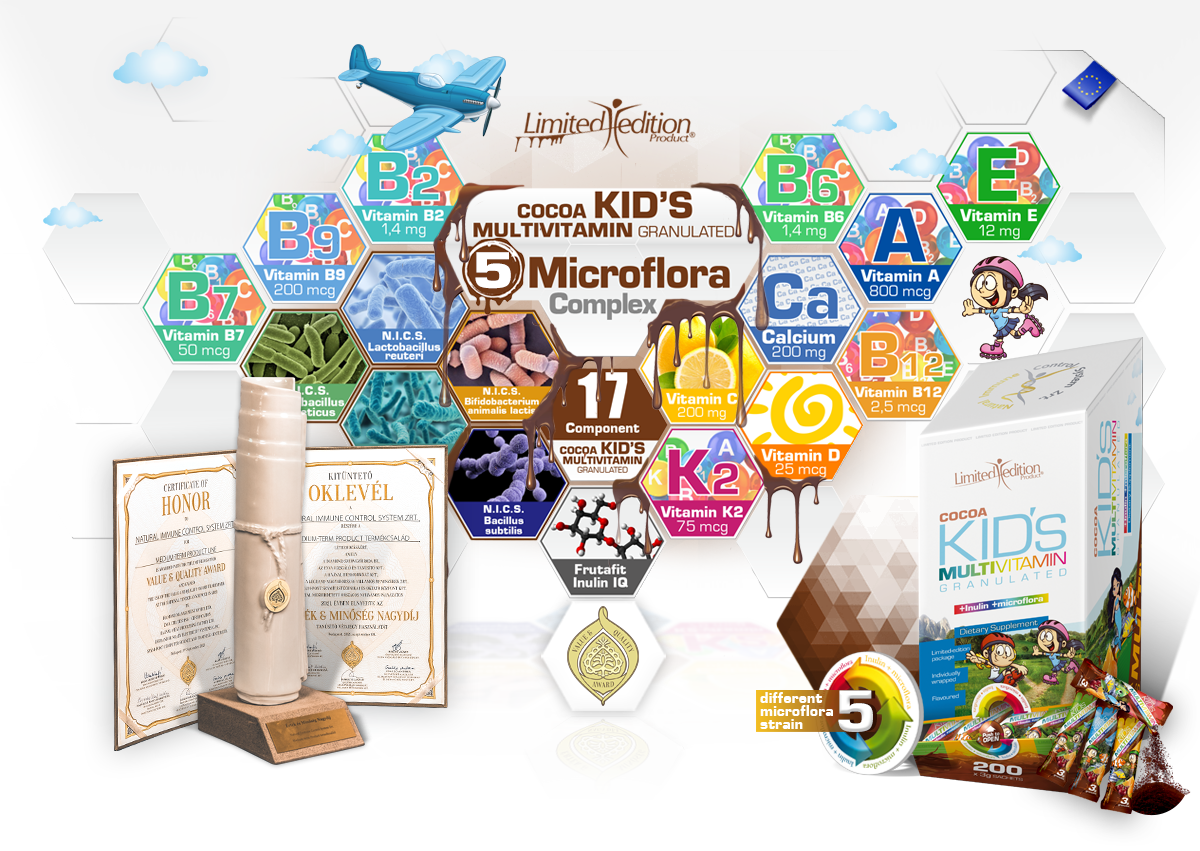|




|
Limited edition product which is available only during the specified
periods. Brand new, unique taste referring to the taste of the chocolate just to inspire
our children to eagerly consume it. The microflora content is different than in case of One Year Products so combined
consumption makes possible to support our body with 11 different type of beneficial strains.
|

|
|
Flavored granules dissolving in the mouth
|
|
As an innovation we have completed our family of granules with a limited edition product. We have developed a brand new, cocoa taste to make the vitamin consumption even more enjoyable for those who are the most important for us, for our children. Regarding the vitamin and mineral content we insisted on the foregoing proven content of the OYP Kid’s Multivitamin. We supplemented these not with the microflora strains known from our One Year Products but with the specially selected microflora strains distinguished by NICS prefix in their name to ensure the possibility by consuming alternately or combined to support the body with 11 different type of microflora strains.
There are 200 individual packages in one box, which means that the portions for each day are packaged separately into hermetically closed moisture-tight sackets. This way you can easily take your children’s daily dietary-supplements with you for example when you are on vacation. It is the best way to keep it hygenic. The sackets do not take up much space and you can not damage them by taking out of the box. Only by pouring the granules into your children’s mouth you have provided them their daily needs of vitamins and minerals.

Outstanding high quality Cocoa to ensure the perfect chocolate taste, directly from Ghana.
Vitamin C is probably the best known vitamin and belongs to the group of water-soluble vitamins. While most animals can synthesize their own vitamin needs, humans must resort to dietary sources. Nutrients of animal sources contain very little Vitamin C, while green plants and fruit provide most of our vitamin C supply. Some plants contain particularly large quantities, for example 1-2 % of the dry weght of rosehip is vitamin C. In its pure form, Vitamin C was first isolated by Albert Szent-Györgyi who found it in adrenal glands in 1928. In 1931, he identified them in lemon juice and bonnet pepper. Szent-Györgyi was awarded Nobel Prize in Medicine for this discovery in 1937.
Main natural sources
Citrus fruit, berries, green and leafy vegetables, tomato and pepper.
|
|
Why is Vitamin C important?
|
|
Vitamin C contributes to our energy-producing metabolic processes, to the maintenance of normal psychological function, to the operation of the nervous and the immune systems. It also helps the formation of collagen and because of this, it maintains healthy skin, blood vessels, cartilage, bones, teeth and gums. It helps reduce fatigue, contributes to regenerating the reduced form of vitamin E and increases the absorption of iron. It contributes to the protection of cells against oxidative stress, and to the normal function of our immune system during or after intense exercise.
Vitamin E is a fat-soluble vitamin which is stored in the liver, adipose tissues, heart, muscles, blood, adrenal glands and hypophysis. It was discovered during the study of vegetable oils in the 1920s and 1930s, but it was only in the 1970s when vitamin E was recognized as vital for humans. Unlike other fat-soluble vitamins, vitamin E - just like vitamin B and C - can only remain in our body for a relatively short period of time.
The main natural sources of vitamin E are
Wheat germ, soybeans, vegetable oils, broccoli, brussels sprouts, spinach, whole grains and egg.
|
|
Why is vitmain E important?
|
|
It protects our cells against oxidative stress.
It is a fat-soluble vitamin. In its natural from, Vitamin K2 can be found in food produced by bacterial fermentation, for instance in aged cheese. It can also be found in food of animal origin, for example goose liver, goose thigh and chicken liver. Vitamin K has a role in normal blood clotting and healthy bones.
Vitamin A is a fat-soluble vitamin. It means that fats and minerals are needed for the absorption of it from the digestive tract. There are two types of vitamin A: preformed vitamin A and provitamin A or carotin.
The main natural sources of vitamin A
Milk, egg, carrot, honeydew melon, apricot, pumpkin, spinach and offal (heart, kidney, liver).
Vitamin A helps maintain normal mucous membranes and healthy skin. It pays an important role in the metabolism of iron and cell differentiation. It contributes to the maintenance of normal vision and the normal function of the immune system.
Vitamin D belongs to the group of fat-soluble vitamins. Vitamin D3 is produced from the dehydrocholesterol produced by the liver by the action of sunlight on the skin. Vitamin D is formed when sunlight hits skin. Ultraviolet rays convert the steroids within the skin to vitamin D. The kidneys and the liver complete the positive effect of the ultraviolet rays and give the opportunity for vitamin D to exert its activity and to transform into its active form. Some prefer to consider vitamin D as a hormone - one of those substances which is produced by the endocrine glands.
Main natural sources
Fish oil, sardines, herring, tuna, salmon, milk and diary products.
|
|
Why is Vitamin D important?
|
|
Vitamin D helps maintain normal calcium level in blood and the normal absorption and utilization of calcium and phosphor. Phosphor is involved in the maintenance of healthy bone structure. Vitamin D plays a role in cell division, helps the maintenance of healthy muscles, bones and teeth. It also helps the normal function of the immune system.
In our body there is more calcium than any other mineral. Calcium and phosphor are collectively responsible for healthy bones and teeth. Most of the calcium of the human body can be found in bones and teeth. About 20% of the calcium in adult bones is absorbed and replaced annually. For its absorption, the body needs enough vitamin D. In addition, it plays an important role in the regulation of irritability and muscle function. In special circumstances such as pregnancy, it may be a required supplement.
The main natural sources of calcium are
Milk and diary products, all kinds of cheese, sardines, salmon, walnuts, sunflower seeds and green leafy plants.
|
|
Why is Calcium important?
|
|
Calcium helps maintain the healthy function of muscles and digestive enzymes. It takes part in the normal blood clotting and energy-producing metabolic processes and in the normal nerve impulse conduction. Calcium is necessary for the maintenance of healthy bones and teeth. In addition, it plays a role in cell division and cell specialization.
This is a water-soluble vitamin family. Vitamin B does not mean one vitamin, it is a vitamin complex (B2, B6, B7, B9, B12). Members of the Vitamin B group are not only connected by the fact that they are water-soluble, but they also carry out tasks together in several tissues of our body.
Vitamin B2 plays a role in energy-producing metabolic processes. It contributes to healthy vision, normal red blood cells, skin and mucous membranes. It helps reduce fatigue, maintains normal iron metabolism and contributes to the protection of cells against oxidative stress.
Vitamin B6 - also known as pyridoxine - is a group of compounds that are structurally related and work together. It was isolated in five independent laboratories in the late 1930s. It is a water-soluble vitamin. It is not stored in our body during metabolism and dissappear from our body in eight hours.
The main natural sources of Vitamin B6
Wheat bran, wheat germ, brewer's yeast, poppy seed, cabbage, milk, egg and beef.
Interesting fact
A lot of anti-nausea medications (occurring during pregnancy) contain vitamin B6.
Vitamin B6 helps maintain normal psychological and nervous system function and reduces fatigue. It plays a role in the energy-producing metabolic processes, in protein, glycogen and cysteine metabolism. Vitamin B6 assists with the normal function of the immune system, the regulation of hormonal activity, the formation of red blood cells and normal homocysteine metabolism.
Vitamin B12 assists with the normal function of the nervous system and helps maintain normal psychological function. It also reduces fatigue. It plays a role in the energy-producing metabolic processes and in cell division. Vitamin B12 contributes to the normal function of the immune system, the normal formation of red blood cells and normal homocysteine metabolism.
Vitamin B9 also known as folic acid is a water-soluble vitamin. It is made up of similarly-built pterindine compounds. Lucy Wills discovered folic acid in the 1930s when she was experimenting with giving yeast to people suffering from anemia.
The main natural sources of Vitamin B9
Leafy vegetables (brussels sprouts, broccoli, lettuce, spinach), bean, liver, yeast, peanut and walnut.
Vitamin B7 assists with the proper function of the nervous system, the maintenance of normal psychological function and healthy mucous membranes, skin and hair. It plays a role in the energy-producing metabolic processes and in the metabolism of the macronutrients.


This Limited Edition Product contain four types of well-assorted bacterial strains in elevated quantity as well as Inulin for increasing efficiency.
Inulin and microflora
Microflora is formed by beneficial, living microorganisms, which survive the acidic environment in the gastrointestinal tract and help maintain the balance of healthy intestinal mircroflora. Our products contain high numbers of bacterial florea and inulin which helps their reproduction. Probiotics word also known as microflora is of Greek origin meaning life. R. B. Parker was the first who used the term probotic in 1974 for organisms and substances responsible for the balance of intestinal tract. The characteristiscs of probiotics are: human origin, non-pathogenic, resistant to the digestive effects of gastric acid, bile, saliva, pancreatic and intestinal fluids. They retain their resilience in food shelf life and technological processes. In addition, probiotics are capable of adhering to mucosal cells, have antimicrobial activity against potential pathogens, and reduce the adherence of pathogenic microbes to the mucosal surface. Probiotics are mostly lactic acid bacteria and bifidobacteria. Most of the best-known probiotic lactic acid bacteria strains are Lactobacillus, smaller portion is Streptococcus genus. Prebiotics are natural nutrients, that are the sole nutrients of probiotics therefore promote their reproduction and prevalance. In the oral cavity and the gastrointestinal tract, the digestive enzymes do not break down the prebiotics and thus can reach the large intestine undigested. Prebiotics are dietary fibers, but water-soluble, therefore one of the best dietary fibers. In addition to their function of dietary fiber, their real utility lies in the fact that they are the exclusive nutrients of probiotics. Because of the lack of digestible nutrition in the large intestine where there is little food, the consumed prebiotics offer the possibility of the reproduction of human-friendly intestinal bacteria. Many foods contain prebiotics, for example: Jerusalem artichoke, chicory, onions, garlic, leeks, artichokes, whole grains, wheat, banana, flax, spinach, cabbage, chard, mustard, berries, legumes, milk and most mature cheese. Inulins are a type of prebiotics and actually dietary fibers that reach the large intestine undigested, enhance the reproduction and prevalance of probiotics. Their role: digestion, balance of the intestinal flora
Our bodies are connected with the outside world through our intestinal system that is about 7-9 meters in length (the largest area in our body). Therefore it is vulnerable by the potential attack of pathogens and toxic substances. Normally there are about 200 to 400 different types of bacterial strains in our bowels. In fetal life beneficial bacteria dominates in 95-98%. Healthy intestinal flora provides protection against a variety of pathogens, ensures the integrity of intestinal mucosa and helps the absorption of the needed nutrients. They produce many essential vitamins for our body. If the gastrointestinal tract's defense mechanisms weaken, it can cause intereference in the absorption processes. In order for probiotics to be effective in their environment, a large number is required which is at least 108 c.f.u./gram in the body. | What does the c.f.u. expression mean? c.f.u.: colony-forming units per milliliter, the number of viable microorganisms. The amount of bacteria is usually measured this way in products. However, inulin is given in milligram. As appropriate doses of at least 109 c.f.u. is accepted. | |
| What kind of probiotic products are effective? - | Prebiotics help the reproduction of probiotics, therefore products should contain inulin or fructo- oligosaccharides. | | - | They resist the effects of stomach acid, bile and digestive enzymes, so the live beneficial bacteria can reach the large intestine, where they are able to adhere and reproduce. One essential condition is that the bacteria keep their viability during their passage through the gastrointestinal tract. | | - | A good probiotic product should contain at least 5-6 strains, as we intend to make up the intestinal flora's multi-culture. | | - | During the warranty period and during technological processes they keep power of resistance. | | - | It contains of an appropriate volume of germs, the minimum quantity proposed by
specialist is 108 or 109 c.f.u. |
| |
|